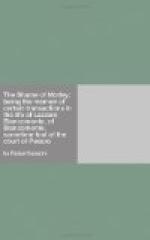One evening in early December I chanced, through the purest accident, to overhear her sharp repulsion of the suit that he had evidently been pressing.
“Madonna,” I heard him answer, with a snarl, “I may yet prove to you that you have been unwise so to use Ramiro del’ Orca.”
“If you so much as venture to address me again upon the subject,” she returned in the very chilliest accents, “I will lay this matter of your odious suit before your master Cesare Borgia.”
They must have caught the sound of my footsteps in the gallery in which they stood, and Ramiro moved away, his purple face pale for once, and his eyes malevolent as Satan’s.
I reflected with pleasure that perhaps we had now seen the last of him, and that before that threat of Madonna’s he would see fit to ride home to Cesena and remain there. But I was wrong. With incredible effrontery and daring he lingered. The morrow was a Sunday, and, on the Tuesday or Wednesday following, Cesare Borgia and his cousin Ignacio were expected. Filippo was in the best of moods, and paid more heed to the Governor of Cesena’s presence at Pesaro than he did to mine. It may be that he imagined Ramiro del’ Orca to be acting under Cesare’s instructions.
That Sunday night we supped together, and we were all tolerably gay, the topic of our talk being the coming of the bridegroom. Madonna’s was the only downcast face at the board. She was pale and worn, and there were dark circles round her eyes that did much to mar the beauty of her angel face, and inspired me with a deep and sorrowing pity.
Ramiro announced his intention of leaving Pesaro on the morrow, and ere he went he begged leave to pledge the beautiful Lady of Santafior, who was so soon to become the bride of the valiant and mighty Ignacio Borgia. It was a toast that was eagerly received, so eager and uproariously that even that poor lady herself was forced to smile, for all that I saw it in her eyes that her heart was on the point of breaking.
I remember how, when we had drunk, she raised her goblet—a beautiful chaste cup of solid gold—and drank, herself, in acknowledgment; and I remember, too, how, chancing to move my head, I caught a most singular, ill-omened smile upon the coarse lips of Messer Ramiro.
At the time I thought of it no more, but in the morning when the horrible news that spread through the Palace gained my ears, that smile of Ramiro del’ Orca recurred to me at once.
It was from the seneschal of the Palace that I first heard that tragic news. I had but risen, and I was descending from my quarters, when I came upon him, his old face white as death, a palsy in his limbs.
“Have you heard the news, Ser Lazzaro?” he cried in a quavering voice.
“The news of what?” I asked, struck by the horror in his face.
“Madonna Paola is dead,” he told me, with a sob.
I stared at him in speechless consternation, and for a moment I seemed forlorn of sense and understanding.




